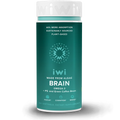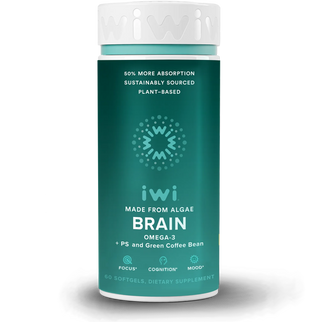In today's fast-paced, digitally-driven world, many Americans have trouble focusing. With a constant influx of social media notifications, emails, and updates, our attention is being pulled in countless directions. The constant bombardment only makes the lure of procrastination even more powerful, which further contributes to a general lack of focus.
However, it's important to understand that difficulty focusing isn't just a byproduct of our modern, hectic lifestyles. There are a variety of other factors that can significantly influence our ability to concentrate and remain attentive.
In this article, we’ll delve into the most common causes of focus issues to help you discover what might be hampering your ability to concentrate — but we won't stop there. We'll also offer actionable, science-backed solutions to help you support your brain health, attention span, decision-making skills, and overall cognitive function.
What Can Impact Your Ability To Focus?
Understanding why you're struggling to maintain focus can be the first step toward finding a solution. Here are 15 of the most common potential reasons that might be hindering your ability to concentrate:
1. Lack of Sleep
When you don't get enough sleep, your brain can struggle to function optimally. Sleep deprivation can result in severe tiredness and a state that’s commonly referred to as “brain fog,” which can significantly impair your ability to concentrate.
The best way to combat these effects is to aim for seven to nine hours of sleep each night. During this time, your brain works on consolidating memories and clearing out waste products, which can help prepare you for a new day of focus and productivity.
2. Poor Nutrition
A diet that lacks essential nutrients can have a negative impact on your cognitive function, reducing your brainpower and making it harder to focus. In particular, foods high in refined sugars and unhealthy fats can cause fluctuations in your blood sugar levels, leading to periods of energy crashes that can affect your focus.
Strive for a more balanced diet that’s rich in fruits, vegetables, whole grains, and lean proteins. Foods rich in omega-3s are especially beneficial as these fatty acids are known to help support learning, memory, cognitive well-being, and blood flow in the brain. Adding iwi life’s omega-3 supplements is an easy way to ensure you’re getting enough of this crucial nutrient and giving your brain the fuel it needs to function properly.
3. Dehydration
Even mild dehydration can impair your mental clarity and focus. Water plays a crucial role in maintaining cellular function, including the cells in your brain. If you're not drinking enough water throughout the day, your brain cells may not operate at their best, which can lead to a lack of focus.
Staying adequately hydrated throughout the day can go a long way toward maintaining your concentration. Keep a water bottle handy, and drink regularly, even if you don't feel thirsty.
4. Stress
High levels of stress can overload your brain, making it difficult for you to focus on important tasks. Chronic stress can even lead to changes in your brain structure and function, affecting memory and attention.
Stress can be a difficult thing to get under control. Stress management strategies such as mindfulness, deep breathing exercises, and yoga may help you regulate your nervous system, manage your stress levels, and enable your brain to function more effectively.
5. Medical Conditions
Certain medical and mental health conditions can significantly impact your ability to focus.
If you're finding it unusually difficult to concentrate and you suspect a medical condition could be the cause, it's crucial to seek advice from a health professional. They can provide a diagnosis and guide you towards effective treatment strategies for these health issues, helping you regain your focus and enhance your overall cognitive function.
6. Lack of Physical Activity
Insufficient physical activity can hamper your focus— when your body doesn't engage in regular exercise, it results in diminished blood circulation to the brain and a decrease in the production of essential neurotransmitters like dopamine and serotonin. This dual effect can significantly impair your concentration abilities.
Addressing this can be as simple as incorporating a regular exercise routine into your lifestyle. Not only will you be working on your physical health, but you’ll be increasing your mental energy as well. Even light activities like walking or stretching can improve blood flow to the brain and stimulate neurotransmitter production, thus enhancing your focus and mental clarity.
7. Excessive Screen Time
Frequent exposure to digital screens can induce what is known as digital fatigue, which can adversely affect your ability to concentrate. The blue light emitted from screens can further disrupt your sleep cycle, which in turn impairs concentration.
The best way to alleviate these issues is to remember to take regular breaks from screens. Allow your eyes and mind to rest periodically, and consider using blue light filtering glasses or apps to reduce the impact of blue light on your sleep patterns.
8. Environmental Distractions
An environment that is noisy or cluttered can diminish your ability to focus effectively. A serene, clean, and well-organized workspace can significantly enhance your concentration and boost your work performance.
Invest time in creating a workspace that’s more conducive to productivity. Keep it clean, organized, and free of unnecessary distractions for improved focus.
9. Multitasking
Attempting to juggle multiple tasks simultaneously can overwhelm your brain and lead to an overall lack of concentration. While it may seem like you’re getting more done, multitasking often results in errors and reduced productivity.
Instead, adopt a single-tasking approach. Concentrate on one task at a time to enhance productivity and maintain focus. This approach can lead to higher-quality work and less mental fatigue.
10. Lack of Structure or Routine
A lack of structure or consistent routine can complicate your ability to focus. The unpredictability and chaos of an unstructured day can lead to difficulty concentrating and reduced productivity.
Combat this by establishing a regular schedule. Creating a to-do list is an easy and effective way to ensure that you’re on track. The sense of control and predictability for what’s next can help alleviate stress and keep you focused on the current task at hand.
11. Overworking
Hard work is admirable, but working for prolonged periods without taking breaks can result in burnout and a diminished ability to focus.
To prevent this, it's crucial to take regular short breaks to rest and rejuvenate your mind. Try following the Pomodoro technique to help prevent overworking. For this time management technique, you would work for a set period of time (say 25 minutes) before taking a short, five-minute break. This practice not only refreshes your cognitive abilities but also prevents fatigue, helping you maintain your focus.
12. Medication Side Effects
Certain medications, such as antihistamines or blood pressure drugs, can interfere with your concentration and focus. If you experience a change in your ability to concentrate after initiating a new medication, it could be a side effect.
In these cases, it's best to discuss the changes with your healthcare provider. They can guide you through possible alternatives or adjustments that could mitigate these effects.
13. Aging
Aging can naturally affect cognitive function and focus — but this doesn't mean a decline in focus is inevitable.
Maintaining regular mental and physical exercise, a healthy diet, and social interaction can help preserve cognitive health as you age. These practices can significantly slow down cognitive decline and keep your focus sharp.
14. Hormonal Changes
Changes in hormone levels during periods such as PMS or menopause can disrupt focus. These fluctuations can alter both mood and cognitive function, leading to difficulty concentrating.
Regular exercise and a healthy diet can help manage these symptoms, providing relief and maintaining your cognitive function during these hormonal shifts.
15. Substance Use
Substances like alcohol, nicotine, or other drugs can negatively impact focus. These substances can alter the brain's neurotransmitters, impairing cognitive function and concentration.
It's essential to monitor and manage substance use. If it's affecting your focus, consider seeking professional help to reduce usage and enhance your cognitive function. Remember, maintaining focus is a journey, not a destination, and every step you take toward better focus counts.
The Takeaway
The list of reasons why you might struggle to focus is very long and features a wide variety of potential causes. The good news is that the list of potential ways to improve your focus is almost just as long. The first step is to identify the root cause of your concentration concerns, and then it’s a matter of making a few lifestyle changes to address it.
One of the easiest ways to support your focus is by adding iwi life’s omega-3 supplements to your daily routine. Our sustainable, algae-derived Brain supplements are specifically designed to support your brain health and overall wellness. Adding a capsule to your daily routine can give your brain the nutrients that it needs to stay focused in the busy and chaotic modern world.
Sources:
Why Everyone's Worried About Their Attention Span—and How to Improve Yours | Time
How Does Lack of Sleep Affect Cognitive Impairment? | Sleep Foundation
Effects of Omega-3 Polyunsaturated Fatty Acids on Brain Functions: A Systematic Review | PMC
How Aging Affects Focus | Harvard Health
Why Multitasking Doesn’t Work | Cleveland Clinic
Cognitive and Neurological Impairment in Mood Disorders | PMC
The Pomodoro Technique Explained | Forbes
Stuck in a Brain Fog? Look in Your Medicine Cabinet | Harvard Health


















